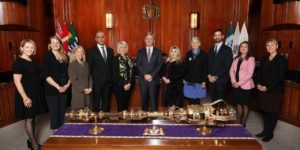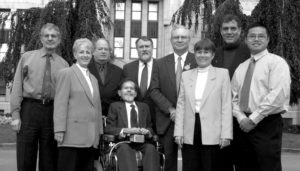 Vancouver City Councillors, l-r, Rebecca Bligh, Christine Boyle, Colleen Hardwick, Pete Fry, Adriane Carr, Mayor Kennedy Stewart, Melissa De Genova, Jean Swanson, Michael Wiebe, Lisa Dominato, and Sarah Kirby-Yung
Vancouver City Councillors, l-r, Rebecca Bligh, Christine Boyle, Colleen Hardwick, Pete Fry, Adriane Carr, Mayor Kennedy Stewart, Melissa De Genova, Jean Swanson, Michael Wiebe, Lisa Dominato, and Sarah Kirby-Yung
Only eleven short months — or, 324 days — from today, about 40% of Vancouver’s exorcised voters will go to the polls to elect the candidates for office who will sit as Vancouver City Councillors from November 2022 through until November 2026.
Despite all their hard work, if history proves a predictor, a good portion of the smiling Councillor faces you see above will not be re-elected to Vancouver City Council, a cruel fate for those Councillors who’ve worked so hard to make our city a fairer and a better city, a home within which to reside, and to raise our beloved children.
In 2018 , after ten years in power, Vision Vancouver failed to elect / re-elect any Vancouver City Councillors. In 2014 , Vision Councillor Tony Tang was not re-elected to a second term. In 2011, COPE City Councillor Ellen Woodsworth lost out to first time candidate, the Green Party of Vancouver’s Adriane Carr, who bested Ms. Woodsworth by a mere 87 votes. In 2008 , incumbent NPA Councillors Kim Capri and Elizabeth Ball were not re-elected to a second term on Council.
In 2005, a year of change, COPE Councillors Dr. Fred Bass, Tim Louis, Anne Roberts and Ellen Woodsworth failed to gain re-election to Council.
 COPE sweeps the 2002 Vancouver municipal election, electing 8 of 10 City Councillors, and Mayor Larry Campbell
COPE sweeps the 2002 Vancouver municipal election, electing 8 of 10 City Councillors, and Mayor Larry Campbell
The Coalition of Progressive Electors (COPE) swept the 2002 Vancouver civic election , winning 8 of 10 Council seats, 7 of 9 School Board seats and 5 of 7 Park Board seats. The Non-Partisan (NPA) was reduced to 2 Council seats, 1 School Board seat and 2 Park Board seats. Vancouver’s Green Party won 1 School Board seat.
Most political observers believe that 2022 will be a year of significant change at Vancouver City Hall, with the likelihood that come late in the evening of Saturday, October 15, 2022 change at Vancouver City will have been wrought.
Political pundits portend that Vancouver will have elected a new Mayor (we’ll write about those prospects on Tuesday and Wednesday), and a more activist Vancouver City Council, the members of which Council will dedicate themselves to serving the majority interests of residents throughout all of Vancouver’s 22 diverse neighbourhoods. Most particularly, renters, and those in search of, or requiring, affordable housing — defined as 20% below the median rate as determined by the Canada Mortgage and Housing Corporation, where a person would spend no more than 30% of their income to keep a roof over their heads. Construction that better and more honestly reflects the incomes of 90% of Vancouver residents, rather than the 10% of high income Vancouver residents, current condominium, duplex, and purpose-built rental construction accommodates.
“Come October 2022, I believe we’re going to see a revolution at Vancouver City Hall,” predicts Patrick Condon, the James Taylor chair in Landscape and Livable Environments at the University of British Columbia’s School of Architecture and Landscape Architecture. “Such a new, activist Council will approve sustainable low-rise and mid-rise wood frame buildings built on city-owned land, consisting mostly of housing co-ops that provide security of tenure, where seniors and diverse families will be housed, those individuals or couples earning the median wage of $50,000 – $63,000. Where no one would have to pay more than 30% of their income to live their home.”
Vancouver could very well be facing a major electoral change in 2022, as it did 20 years previous, electing a Mayor and Vancouver City Council of almost entirely newly-elected officials — dedicated to serving all of the diverse communities in neighbourhoods across our city, a Council committed to slow growth and gentle density, dedicated to affordable low-and-medium-rise wood frame buildings over podium and high-rise tower-driven plinth construction, as well as social housing that meets the needs of the many rather than the few, with new parks throughout the city, as well as more new and renewed publicly-owned recreation centres.